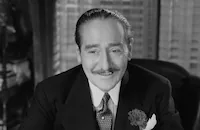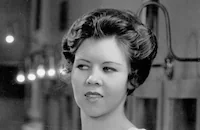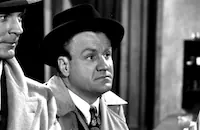Bundle of Joy

Brief Synopsis
Cast & Crew
Norman Taurog
Eddie Fisher
Debbie Reynolds
Adolphe Menjou
Tommy Noonan
Nita Talbot
Film Details
Technical Specs

Synopsis
Just before Christmas at the Merlin and Son department store, millinery saleslady Polly Parrish expects a raise in honor of her high sales record. Instead, however, her bosses, Mr. Creely and Mr. Hargraves, plan to fire her for her overzealous selling techniques, which result in numerous returns. Meanwhile, store owner John B. Merlin sees to every detail of the store's administration, and worries that his son Dan will resent giving up his interest in music in order to join his father in business. After assuring his father that he is happy to run the store, Dan secretly sings in the employee lounge. After Polly turns down supply clerk Freddie Miller's invitation to a dance contest that night, she is called into Merlin's office and fired. Shocked and upset, Polly is forced to accept Freddie's invitation in order to compete for the $100 prize money. On her lunch break she searches for a new job, but finds none. Next to the employment office is an orphanage, outside which Polly spots a baby and picks him up. Orphanage manager Mr. Appleby immediately assumes she is the mother, and attempts to convince her to keep the child, but Polly flees. Appleby discovers her work address, however, and goes there to urge Dan to re-hire Polly so she can afford to care for her child. Dan calls Polly in and announces that she is getting a raise and a gift that will be delivered to her that night. Confused, Polly goes home to find Mr. Appleby and the baby, and although she tries to return the child, Appleby refuses to take him back. Freddie then arrives to pick Polly up for the dance, and upon seeing the baby, assumes with glee that Polly's morals are more lax than she has previously indicated. When they see the Merlins on television receiving an award, Polly decides to drop off the baby at their house. She leaves the child with Adams, the Merlins' butler, and when Dan learns of the ruse, he jumps into his car and follows Polly and Freddie to the dance contest. There, Dan is forced to take a partner on the floor in order to talk to Polly, but is disqualified before he can reach her. Freddie and Polly, to their disappointment, win a trophy instead of cash, and later, Polly finds Dan waiting in her apartment with the baby. Furious and disbelieving of her story that she found the baby, Dan fires Polly again. To gain his sympathy, she lies that her husband beat her and she cannot afford to keep the child, prompting Dan to once again offer her a raise. After he leaves, Polly's landlady, Mrs. Dugan, helps her to care for the baby. When Polly, who knows so little about children that she thinks the baby is a girl, names him Jean, Mrs. Dugan agrees that "John" is a good name. At work the next day, Polly is exhausted, but is pleased by Dan's continuing attention. Freddie, who assumes that Dan is the baby's father, urges Polly to "put in a good word" for him, and when he is coincidentally promoted soon after, believes she influenced Dan. Later, Dan visits Polly with gifts for John, and clumsily helps her sing the baby to sleep. On New Year's Eve, Polly is content to stay home with John, whom she has grown to love. However, Dan, whose date has cancelled on him for not calling her sooner, shows up at her door and announces that Mrs. Dugan will baby-sit while they attend a dance. Because Polly has no appropriate clothes, Dan brings her to the store and outfits her in sequins and furs. Her beauty stuns the other men at the dance, who monopolize her all evening, despite Dan's pretense that she is Swedish and knows no English. Just before midnight, Dan insists that they leave, and they are swept into the raucous revelry in the city streets. They are separated in the crowd but meet back at Polly's apartment, where Dan fires her in order to kiss her without breaking company rules. After a passionate embrace, he re-hires her. The next day, Polly is forced to turn down Dan's offer of a date because she has no one to watch John, and although she fears that he is losing interest, in reality he is arranging for her to receive another raise so she can hire a sitter. Meanwhile, Freddie is demoted for his incompetence, and extracts revenge by sending a note to Merlin stating that Dan has a son. Merlin receives the note while Dan and Polly are meeting in the park, and pursues them there. When Merlin sees John, he is overjoyed, and orders Dan to marry Polly and move the boy onto their estate. Dan tries to explain that he is not the father but Merlin, desperate for a grandchild, declares that he will get John one way or another. Dan races to Polly's to warn her that his father is summoning his lawyers, and Polly, who is determined to keep John, feels insulted by Dan's insistence that he will not allow his father to force him to marry her. She throws Dan out, then persuades Mrs. Dugan's college-aged nephew, Mike Clancy, to pose as her long-lost husband. She brings Mike to Merlin's, where the old man sadly accepts her tale that the child is theirs. Just then, however, Dan, who has had the same idea, brings in Freddie, claiming that he is the baby's father. Assuming that Mike is Polly's abusive ex-husband, Dan punches the young man, and in the ensuing chaos Polly runs home. She is packing her bags when Dan bursts in. Polly declares that she is leaving with the baby, but Dan declares that he is John's new father, and Polly realizes that he trying to propose. Together, they admire their "bundle of joy."

Director

Norman Taurog
Cast
Eddie Fisher

Debbie Reynolds

Adolphe Menjou

Tommy Noonan

Nita Talbot

Una Merkel

Melville Cooper

Bill Goodwin
Howard Mcnear
Robert H. Harris

Mary Treen

Edward S. Brophy

Gil Stratton
Scott Douglas
Donald Gray
David Gray

Paul Maxey
Jean "babe" London
Ed Hinton
John Kame
Pamela Jayson
Elizabeth Flournoy
Katharine Barrett
Douglas Evans
Joey Ray
Alan Ray
Rex Lease

Lyle Latell
Gil Perkins
Bonnie Bolding
Mabel Rea
Elaine Earl
Bill Bradley
James Gonzales
Leon Tyler
Roxanne Arlen
Hal Taggart
Ruell Shayne

Eddie Ryder
Bob Lockwood
Camille Williams
Madeline Foy
Crew
Eli Benneche
Cliff Broughton
Robert Carson
Nick Castle
Albert S. D'agostino
Emmett Emerson
Larry Germain
Mack Gordon
Edmund Grainger
Walter Holscher
Felix Jackson
Terry Kellum
Norman Krasna
Harry Maret Jr.
Harry Marker
Josef Myrow
Walter Scharf
Arthur Sheekman
Howard Shoup
William Snyder
Jean Speak
Hugo Winterhalter

Photo Collections
Videos
Movie Clip



Trailer
Hosted Intro
Film Details
Technical Specs

Articles
Bundle of Joy
A remake of Bachelor Mother (1939), starring Ginger Rogers, Bundle of Joy was the musical version of a single woman who finds an abandoned baby but then discovers she is unable to convince people that the baby isn't hers. The production came complete with its own built-in twist: Reynolds became pregnant just before filming began - due to deliver two months after shooting wrapped and one month before the theatrical release. Talk about timing. Yet all was not well on the set: Reynolds and Fisher were beginning to have marital troubles, the results of a seemingly endless power struggle for the limelight. Tensions ran high and Reynolds recalls (in her autobiography) "One morning driving to the studio we managed to get into an incredible argument over whether or not Jesus was born a Jew. Eddie claimed he was not. Eddie had never heard of the King of the Jews. There we were, America's sweethearts, at six A.M., driving down Melrose Avenue in Hollywood, arguing about Jesus being a Jew....several blocks from the studio, I couldn't take it anymore. "Stop the car!" I shouted....He slammed on the brakes. I got out and slammed the door behind me. He drove away in a fury, and I walked to work, so upset I was shaking." Coincidentally, one of Fisher's few acting offers after Bundle of Joy was a script titled King of the Jews.
Fisher was often emotionally frustrated with his wife, but admittedly impressed with Reynolds' professional doggedness. He recalled, "One day, with the temperature on the set at about 120 degrees, we were doing a scene together and she stood under the hot lights in a mink coat during at least fifteen takes, just because the director wanted a few reaction shots." Reynolds was indeed the consummate performer until the end - over Fisher's protests, she was sweating out complex dance numbers at seven months pregnant without missing a beat.
The supporting cast for Bundle of Joy included Adolphe Menjou and Una Merkel, both distinguished character actors. Menjou, the epitome of the dapper, mustachioed gent, earned an Oscar nod for his work in The Front Page (1931). Fittingly, the immaculately dressed actor's autobiography was titled It Took Nine Tailors. Merkel's skill at playing a range of smart-mouthed, brassy women boosted her fortunes: often cast alongside Jean Harlow, the actress peaked not once but twice with Destry Rides Again (1939) and Summer and Smoke (1961). Her varied career caused her to comment, "I liked a variety. I was glad to do anything when the part was good. I didn't care what I was supposed to be." Merkel would work again with Reynolds three years later in The Mating Game (1959). And in another film connection, the director, Norman Taurog, would direct Merkel again, this time in the Elvis Presley vehicle Spinout (1966).
Taurog, who directed more Presley films than any other director, also helmed Oscar winner Skippy (1931) and Boys Town (1938). Nonetheless, Fisher declared that his "chief claim to fame was his ability to work with singers who couldn't act." Fisher later stated in his autobiography, "I tried my best to do a good job. In fact, both Debbie and I worked so hard that we didn't even go home during the last few weeks of shooting. We stayed in a bungalow on the lot." Despite this, the critics weren't overly enthusiastic about their movie. Time magazine decreed, "Eddie Fisher, no actor, has a pleasant voice and Debbie Reynolds has a pleasant face." Bundle of Joy was not the success that RKO had hoped for and was a professional blow to the couple. But the arrival of their daughter, Carrie, overshadowed the disappointment. Effectively making her film debut, the studio took out a huge ad in the trades the day after she was born promoting the film to be the "most prosperous holiday gift you ever had."
A short time later, Eddie became the next Mr. Elizabeth Taylor, a move which served Reynolds’ career well - American audiences were highly sympathetic to the image of the jilted wife, particularly one with such wholesome appeal. Reynolds would go on to more film roles, a successful nightclub venture in Las Vegas, and a recurring role on the popular sitcom Will and Grace. Fisher would later get royally dumped by Taylor for Richard Burton, but when pressed about what lessons he learned from his first marriage, he plainly offers, "That's simple: Don't marry Debbie Reynolds."
Producer: Edmund Grainger
Director: Norman Taurog
Screenplay: Robert Carson, Felix Jackson, Norman Krasna, Arthur Sheekman
Cinematography: William E. Snyder
Film Editing: Harry Marker
Art Direction: Albert S. D'Agostino, Walter Holscher
Music: Josef Myrow
Cast: Eddie Fisher (Dan Merlin), Debbie Reynolds (Polly Parish), Adolphe Menjou (J. B. Merlin), Tommy Noonan (Freddie Miller), Nita Talbot (Mary), Una Merkel (Mrs. Dugan).
C-99m. Closed captioning.
by Eleanor Quin

Bundle of Joy
Quotes
Trivia
The film was made to capitalize on 'Debbie Reynolds' ' real-life pregnancy, which makes this film Carrie Fisher's debut.
Notes
Bundle of Joy was a remake of the 1939 RKO film Bachelor Mother, directed by Garson Kanin and starring Ginger Rogers and David Niven (see AFI Catalog of Feature Films, 1931-40). Norman Krasna, who wrote the screenplay for Bachelor Mother, and Felix Jackson, who wrote the story, are credited on Bundle of Joy along with screenwriters Robert Carson and Arthur Sheekman. According to a May 1954 Daily Variety news item, George Jessel planned to remake Bachelor Mother at RKO that year with Betty Hutton as the star. Although a February 21, 1956 Hollywood Reporter article states that the film would be an "Edmund Grainger independent production in conjunction with RKO," Grainger's production company is not listed in the onscreen credits.
RKO borrowed Debbie Reynolds from M-G-M for Bundle of Joy, which marked her only onscreen teaming with then-husband Eddie Fisher. Although Fisher had acted in a small role in the 1950 film All About Eve (see AFI Catalog of Feature Films, 1941-50), his role was cut from that film, making Bundle of Joy his motion picture debut. Reynolds was pregnant during production and gave birth to daughter Carrie in October 1956, two months before the film's premiere. Despite the studio's attempt to link the Fishers to the happy family in the film, Reynolds noted in her autobiography that the marriage was already failing. The sequence in the film in which "Dan Merlin" outfits "Polly Parrish" in finery is rendered in silence, with only a background score.
According to a March 7, 1961 Daily Variety article, RKO was sued by Ramrod Productions, Inc., which held a ten-year contract with Fisher. Ramrod sought a restraining order against any further television screenings of Bundle of Joy, in addition to damages of $1,400,000. The disposition of the suit has not been determined. Reynolds received a 1956 Golden Globe nomination for Best Actress, Musical or Comedy for her role in the film.

Miscellaneous Notes
Released in United States Winter December 1956
Remake of the screwball comedy classic, "Bachelor Mother" (1939), which starred Ginger Rogers, David Niven and Charles Coburn.
Released in United States Winter December 1956
















